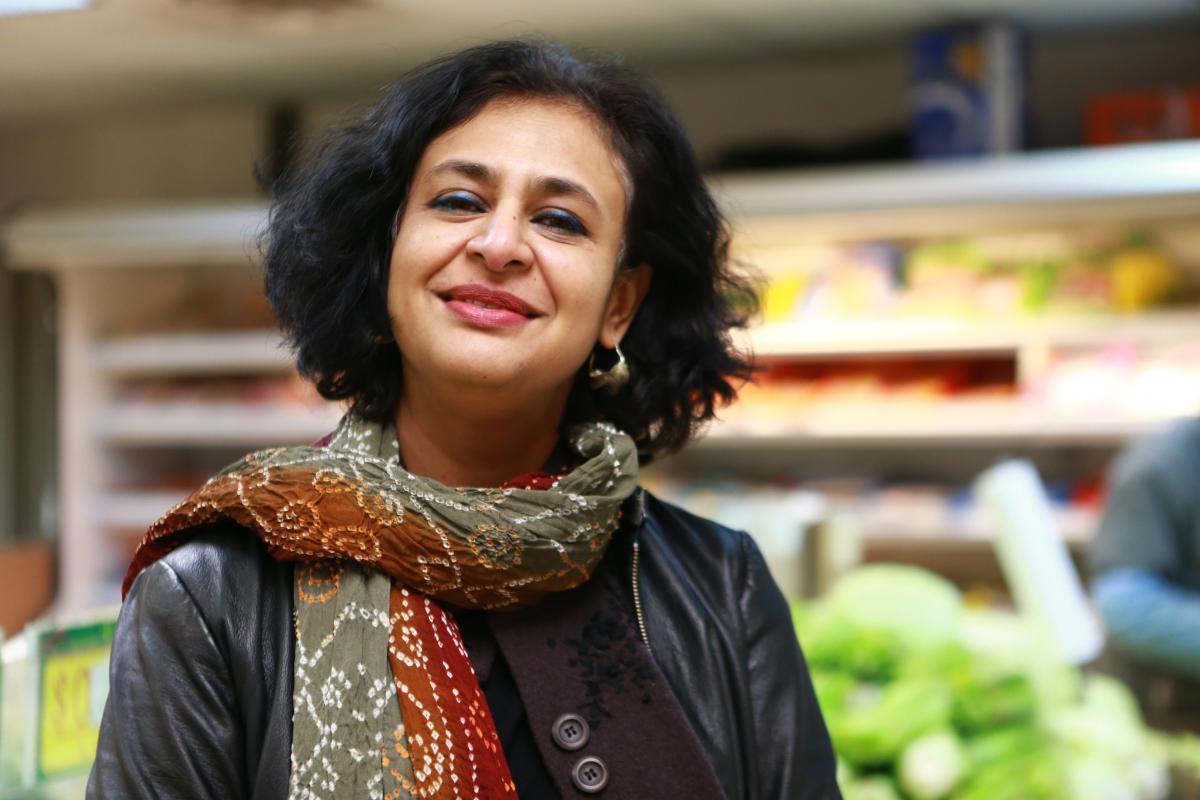Srinivas Awarded Fellowship to Study Environmental Impacts on Religion

What happens to a religion largely based on nature when that natural world is ravaged by toxic pollution and political corruption? Where do people turn when both their way of life and their deities abandon them?
Tulasi Srinivas, associate professor of anthropology in the Institute for Liberal Arts and Interdisciplinary Studies, recently was awarded a prestigious fellowship from the American Council of Learned Societies (ACLS) to answer those questions in a forthcoming book, The Absent Goddess: Religion, Ecology and Violence in Urban India.
“It’s ultra-competitive,” Srinivas said of the fellowship, offered through the Luce/ACLS Program in Religion, Journalism and International Affairs, “so I’m grateful they thought my idea was worth supporting.”
Srinivas’ research centers around her hometown of Bangalore, in south India, often called “the Silicon Valley of Asia.”
In the last 30 years or so, as the city has grown into an information technology hub, it has undergone rapid and unchecked development aided by “development and construction mafias” and corrupt government officials, Srinivas said. In a 2016 report, the Centre for Ecological Sciences in Bangalore said the metro area was looking at a 525 percent increase in built-up area, a 78 percent decline in vegetation, and a 79 percent decline in bodies of water, and would be “unlivable” in five years, according to Srinivas’ research.
A little over a year ago, she said, toxic foam floating on top of Bellandur Lake — the result of industrial waste being dumped into the sacred body of water – caught fire, spewing chemical pollutants and foul odors throughout surrounding neighborhoods.
A short time later, Srinivas said she saw a young woman who lived on the lake interviewed on TV. When asked her thoughts about the lake fire, the woman said, “The Lake Goddess is now absent, raped by developers. She is lost … maybe she has run away from this hell.”
Hinduism, the dominant religion in the region, is a nature-based belief system, with gods and goddesses of rocks, woods, lakes, and other natural features, Srinivas said.
“It struck me as very telling,” Srinivas said. “When goddesses and gods leave, what happens?”
Srinivas said she arrived at the idea for her latest study while working on her last book, The Cow in the Elevator: An Anthropology of Wonder, about how urban Indians are using the concept of “wonder” to bridge the divide between traditional religion and the modern world. (The eponymous “Cow in the Elevator” refers to an incident when a young, professional, newlywed couple convinced a Hindu priest to shove a cow into the service elevator of their luxury high-rise building so the animal could cross their threshold and bless their home – a new twist on an old agrarian tradition.)
Srinivas said she began to notice that some of the changes in religious practice were due to changes in the environment. For instance, a wildflower used in a particular ceremony had been replaced by fruit because the flower no longer grows in the area. A river running through Bangalore that was once used to bathe images of the gods and goddesses is now so contaminated with raw sewage, that many younger people are unaware that it is actually a river.
“I just had hints of it,” she said. “And then the hints started piling up and … when the lake burst into flames a second time with toxicity I thought this is larger and much more central than I imagined.”
The ravaged environment doesn’t just have religious implications. People who used to live off the land or the lakes have instead turned to jobs in construction, supporting the very development that has completely altered their way of life, Srinivas said.
“It becomes this terrible tale of displacement and fear,” she said.
The fellowship will allow Srinivas to take a yearlong sabbatical starting in Fall 2018, and during that time she will travel to India to continue interviewing sources.
Institute Dean Amy Ansell has been “so supportive,” said Srinivas, who, in 2016 was awarded a Radcliffe Fellowship to finish The Cow in the Elevator.
She also credits Journalism Assistant Professor Tim Riley, who read her ACLS fellowship application and has been “just amazing” about giving her support and feedback.
Srinivas and Riley are hoping to start a small working group that looks at how journalism covers religion. Emerson faculty, as well as the College itself, really benefits from cross-pollination between departments and schools, she said.
Through the fellowship, Srinivas also will attend workshops, including two that link scholarship with journalism in a very “hands-on” manner, she said.
“One thing I think scholars need to do better is sort of make the information more easily available to people, and I think that journalists do that beautifully,” she said, “so there’s always something to learn.”
Categories